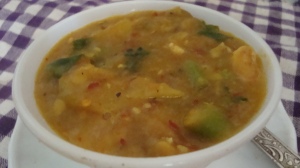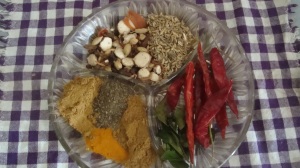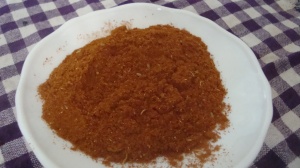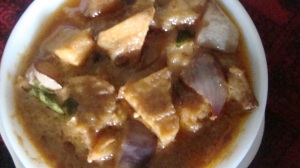One of our neighbours brought us some boiled palmyrah roots from their recent trip to Jaffna. My mother decided to make a snack that her grandmother used to make her during her childhood. So, today’s recipe is a palmyrah root snack or ‘panang kilangu urundai’. I am bringing this snack together with some music to Angie‘s Fiesta Friday #117, co-hosted by Mollie and Scarlett.
 Today’s music feature is on the Carnatic progressive rock band, Agam, which is based in Bangalore. While the band has been around for a decade or so, I only heard their music when they played at the MTV Coke Studio. ‘Malhar Jam’ is the clip that introduced me to their music.
Today’s music feature is on the Carnatic progressive rock band, Agam, which is based in Bangalore. While the band has been around for a decade or so, I only heard their music when they played at the MTV Coke Studio. ‘Malhar Jam’ is the clip that introduced me to their music.
The second music clip is called ‘over the horizon’. I came across this Malayala song, which I liked, while listening to some of Agam’s music on their youtube channel.
Hope you enjoy both the snack and the music!

Palmyrah root snack
Ingredients:
- Palmyrah root (panang kilangu), boiled – 1 cup, chopped
- Grated/ scraped coconut, fresh – ¼ cup
- Green chillies – 1 or 2
- Onion – ½
- Pepper – pinch
- Salt, to taste
Method
- Boil the palmyrah roots. Trim the edges and chop it up.
- Add chopped boiled palmyrah root pieces to a dry grinder together with the freshly grated coconut, chopped green chillies and onion.
- Grind the mix and season with salt and pepper.
- Form little balls of the mixture or in a mold and serve as a snack, to be eaten immediately.
Recipe source: Raji Thillainathan.


 For today’s music feature, I wish to share some song clips from youTube from the official vevo site of one of my favourite singers – Andrea Bocelli. The first is a music video of the song ‘Canto Della Terra’. The second song ‘Con Te Partiro’ is from a 2011 concert. I liked more an earlier version, where he sings with Sarah Brightman, but could not find it on the official site. The last clip is the music video of the song with Laura Pausini ‘Dare to Live’. Hope you enjoy the music and the recipe!
For today’s music feature, I wish to share some song clips from youTube from the official vevo site of one of my favourite singers – Andrea Bocelli. The first is a music video of the song ‘Canto Della Terra’. The second song ‘Con Te Partiro’ is from a 2011 concert. I liked more an earlier version, where he sings with Sarah Brightman, but could not find it on the official site. The last clip is the music video of the song with Laura Pausini ‘Dare to Live’. Hope you enjoy the music and the recipe! 









